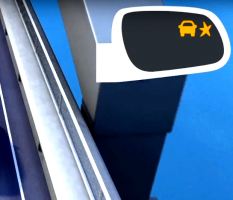
— A Chevy Bolt blind spot monitoring lawsuit alleges the passenger's blind spot detection sensors activate the warning lights when there is nothing present in the blind spots.
The 2018-2020 Chevrolet Bolt class action lawsuit says the blind spot monitoring systems have sensors that don't have proper shields which can easily detach from the sensors.
The sensor shielding is a piece of aluminum adhesive placed over part of the sensor to prevent the sensor from detecting the vehicle’s own tires.
The Bolt class action includes all U.S. former and current 2018-2020 Chevy Bolt electric vehicles equipped with blind spot monitoring systems.
Other than driving a driver insane with unnecessary blind spot warning, the alleged problem also causes a safety hazard to drivers and others.
California plaintiff Loren Stone purchased a new 2018 Chevy Bolt with a passenger blind spot warning light that frequently activated when nothing was in the Bolt's blind spot.
The GM dealership allegedly failed to diagnose the problem and replaced the driver-side mirror, but the blind spot warnings didn't stop. The plaintiff says the false warnings caused him "annoyance and confusion."
The plaintiff took the Bolt to the dealer in October 2020 because the blind spot monitoring warnings continued, and this time the dealer correctly diagnosed the problem.
The dealer fixed the blind spot sensor problem by replacing the foil adhesive shielding, but the plaintiff says he was charged "$62.46 for a defect GM knew existed at the time of purchase."
The Bolt class action lawsuit says General Motors issued a technical service bulletin in November 2017 regarding 2017 Chevy Bolts with blind spot monitoring problems.
In addition to butyl tape application at the sensor bracket, the TSB said an electrical connection and routing issue with the sensor harness and poor grounding may have had problems.
According to the class action lawsuit, the 2018-2020 Chevy Bolts were sold with the same blind spot monitoring system problems, but the electric vehicles were still sold to consumers.
GM finally did issue a blind spot monitoring TSB in October 2020 which said the blind spot sensor shield could have problems. The plaintiff says GM could have fixed the entire problem in 2017, but instead chose to force Bolt customers to pay for repairs.
And those Bolt owners and lessees allegedly haven't been reimbursed for those expenses.
The Chevy Bolt blind spot monitoring lawsuit was filed in the U.S. District Court for the Central District of California: Loren Stone, v. General Motors, LLC.
The plaintiff is represented by Kazerouni Law Group APC.




